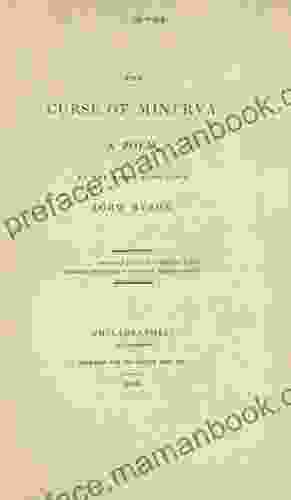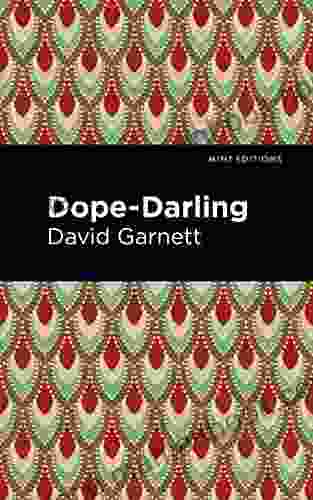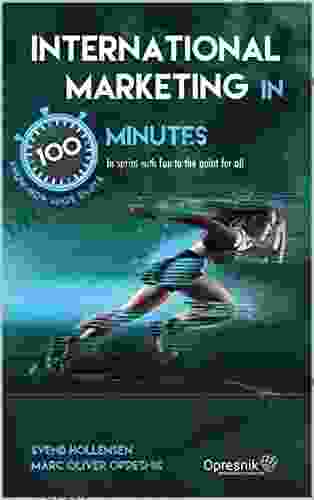Unveiling the Curse of Minerva: An Exploration of Lord Byron's Poetic Masterpiece

Lord Byron, the enigmatic and rebellious Romantic poet, penned one of his most profound and enduring works in 1812: "The Curse of Minerva." This complex and evocative poem grapples with themes of cultural heritage, the ravages of war, and the nature of poetic inspiration. Through its intricate tapestry of history, mythology, and personal experience, "The Curse of Minerva" stands as a testament to Byron's brilliance and his unwavering commitment to truth and beauty.
Historical Context
To fully appreciate "The Curse of Minerva," it is crucial to understand the historical context in which it was written. In 1801, the British army, under the command of Lord Elgin, removed a vast collection of sculptures from the Parthenon in Athens. These sculptures, known as the Elgin Marbles, were transported to London and housed in the British Museum.
4.5 out of 5
| Language | : | English |
| File size | : | 6765 KB |
| Screen Reader | : | Supported |
| Print length | : | 34 pages |
| Lending | : | Enabled |
| Paperback | : | 128 pages |
| Item Weight | : | 6.4 ounces |
| Dimensions | : | 6 x 0.29 x 9 inches |
Byron, a passionate philhellene (lover of Greece),was outraged by this act of cultural plunder. He saw the removal of the Elgin Marbles as a betrayal of Greece's heritage and a symbol of British imperialism. "The Curse of Minerva" was written as a direct response to this event, expressing Byron's anger and sorrow over the loss of such precious cultural treasures.
Mythological Allusions
The title of the poem itself alludes to the Greek myth of Minerva, the goddess of wisdom and war. According to the myth, Minerva was born from the head of Zeus, fully armed and resplendent in her glory. However, she was also a fierce protector of her city, Athens, and would curse those who threatened it.
In "The Curse of Minerva," Byron casts Britain as the modern-day embodiment of Minerva. He accuses the British of plundering Greece's cultural heritage and, in ng so, incurring the wrath of the goddess. The poem is filled with references to Minerva and her power, as Byron weaves ancient mythology into his contemporary critique.
Structure and Imagery
"The Curse of Minerva" is a complex poem, both in its structure and its imagery. The poem is written in Spenserian stanzas, a nine-line stanza form that was popularized by Edmund Spenser in "The Faerie Queene." The Spenserian stanza is known for its intricate rhyme scheme and its ability to create a sense of grandeur and elevation.
Byron's use of imagery in the poem is equally striking. He paints vivid pictures of the Parthenon, the Elgin Marbles, and the ravages of war. The poem is filled with sensory details that appeal to the reader's sight, sound, touch, and smell, creating a powerful and immersive experience.
Themes
"The Curse of Minerva" explores a wide range of themes, including cultural heritage, the ravages of war, and the nature of poetic inspiration. Byron argues that cultural heritage is essential to a nation's identity and that its destruction is a crime against humanity.
The poem also decries the horrors of war, vividly depicting the suffering and destruction that it brings. Byron's own experiences in the Napoleonic Wars had left him deeply scarred, and this poem is a powerful expression of his anti-war sentiments.
Finally, "The Curse of Minerva" is a reflection on the nature of poetic inspiration. Byron suggests that true poetry is inspired by a deep love of one's country and a desire to protect its heritage. He sees the poet as a guardian of culture, a voice for the voiceless, and a beacon of truth in a world often shrouded in darkness.
"The Curse of Minerva" is a powerful and moving poem that continues to resonate with readers today. It is a testament to Lord Byron's genius and his unwavering commitment to truth, beauty, and justice. Through its intricate tapestry of mythology, history, and personal experience, the poem offers a profound meditation on the nature of cultural heritage, the ravages of war, and the transformative power of poetry.
References
- Byron, George Gordon, Lord. "The Curse of Minerva." The Norton Anthology of English Literature, edited by Stephen Greenblatt, Norton, 2012, pp. 737-740.
- McGann, Jerome J. Lord Byron: Romantic Poet. University of Chicago Press, 2002.
- Peck, John. Lord Byron: A Critical Biography. Palgrave Macmillan, 2018.
4.5 out of 5
| Language | : | English |
| File size | : | 6765 KB |
| Screen Reader | : | Supported |
| Print length | : | 34 pages |
| Lending | : | Enabled |
| Paperback | : | 128 pages |
| Item Weight | : | 6.4 ounces |
| Dimensions | : | 6 x 0.29 x 9 inches |
Do you want to contribute by writing guest posts on this blog?
Please contact us and send us a resume of previous articles that you have written.
 Top Book
Top Book Novel
Novel Fiction
Fiction Nonfiction
Nonfiction Literature
Literature Paperback
Paperback Hardcover
Hardcover E-book
E-book Audiobook
Audiobook Bestseller
Bestseller Classic
Classic Mystery
Mystery Thriller
Thriller Romance
Romance Fantasy
Fantasy Science Fiction
Science Fiction Biography
Biography Memoir
Memoir Autobiography
Autobiography Poetry
Poetry Drama
Drama Historical Fiction
Historical Fiction Self-help
Self-help Young Adult
Young Adult Childrens Books
Childrens Books Graphic Novel
Graphic Novel Anthology
Anthology Series
Series Encyclopedia
Encyclopedia Reference
Reference Guidebook
Guidebook Textbook
Textbook Workbook
Workbook Journal
Journal Diary
Diary Manuscript
Manuscript Folio
Folio Pulp Fiction
Pulp Fiction Short Stories
Short Stories Fairy Tales
Fairy Tales Fables
Fables Mythology
Mythology Philosophy
Philosophy Religion
Religion Spirituality
Spirituality Essays
Essays Critique
Critique Commentary
Commentary Glossary
Glossary Bibliography
Bibliography Index
Index Table of Contents
Table of Contents Preface
Preface Introduction
Introduction Foreword
Foreword Afterword
Afterword Appendices
Appendices Annotations
Annotations Footnotes
Footnotes Epilogue
Epilogue Prologue
Prologue Nolan Amory Kingston
Nolan Amory Kingston Vijay Reddy
Vijay Reddy Jaishree Sharad
Jaishree Sharad T L Coston
T L Coston A M Khalifa
A M Khalifa Henry Steel Olcott
Henry Steel Olcott Andy Greenberg
Andy Greenberg Andrew Dobell
Andrew Dobell Daisy Christodoulou
Daisy Christodoulou Molly Huddle
Molly Huddle Leonard Mlodinow
Leonard Mlodinow Kody Boye
Kody Boye Tae Keller
Tae Keller J R Rain
J R Rain E Ethelbert Miller
E Ethelbert Miller Mia Bowen
Mia Bowen Leslie Becker Phelps Phd
Leslie Becker Phelps Phd Mayara De Godoy
Mayara De Godoy Marg Ruttan
Marg Ruttan P W Singer
P W Singer
Light bulbAdvertise smarter! Our strategic ad space ensures maximum exposure. Reserve your spot today!

 Aldous HuxleyMarvel Action Captain Marvel 2024 Khalifa: The Next Generation of Superheroes
Aldous HuxleyMarvel Action Captain Marvel 2024 Khalifa: The Next Generation of Superheroes
 David PetersonHow to Create Products and Services Customers Want: The Strategyzer Approach
David PetersonHow to Create Products and Services Customers Want: The Strategyzer Approach
 Hunter MitchellEscape to Tranquility: A Journey through the Cottage Country Haiku Collection
Hunter MitchellEscape to Tranquility: A Journey through the Cottage Country Haiku Collection Eddie PowellFollow ·4.7k
Eddie PowellFollow ·4.7k Dennis HayesFollow ·2.8k
Dennis HayesFollow ·2.8k Roger TurnerFollow ·10.5k
Roger TurnerFollow ·10.5k Anthony BurgessFollow ·12.3k
Anthony BurgessFollow ·12.3k Raymond ParkerFollow ·16.1k
Raymond ParkerFollow ·16.1k Thomas HardyFollow ·5.8k
Thomas HardyFollow ·5.8k Adrian WardFollow ·3.2k
Adrian WardFollow ·3.2k Junichiro TanizakiFollow ·10.6k
Junichiro TanizakiFollow ·10.6k

 Vincent Mitchell
Vincent MitchellUnveiling the Enchanting Tale of Plant Reproduction: A...
Plants, the silent yet vibrant...
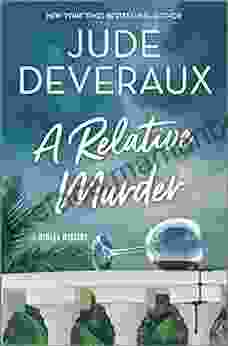
 Sam Carter
Sam CarterDelve into the Enigmatic World of "Relative Murder: A...
In the realm of mystery and suspense, the...
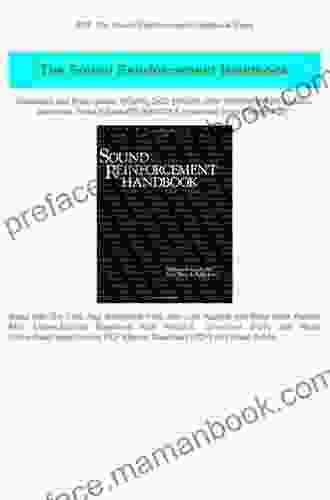
 Richard Simmons
Richard SimmonsThe Sound Reinforcement Handbook: A Comprehensive Guide...
In the realm of live sound engineering, The...

 Leo Tolstoy
Leo TolstoyEnter the New Era of Cyberwar: Unmasking the Kremlin's...
`` Prologue: The Digital...
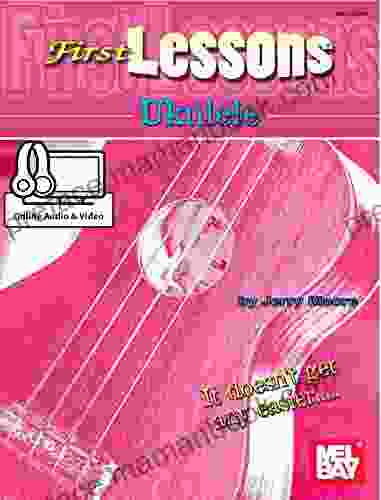
 Brenton Cox
Brenton CoxFirst Lessons Ukulele Bridget Baker: A Comprehensive...
Embarking on a musical journey with the...
4.5 out of 5
| Language | : | English |
| File size | : | 6765 KB |
| Screen Reader | : | Supported |
| Print length | : | 34 pages |
| Lending | : | Enabled |
| Paperback | : | 128 pages |
| Item Weight | : | 6.4 ounces |
| Dimensions | : | 6 x 0.29 x 9 inches |


